For many Georgia homeowners, the idea of building an Accessory Dwelling Unit (ADU) is both exciting and overwhelming. With rising home prices, increased rental demand, and the need for flexible living spaces, ADUs—also known as tiny homes, backyard cottages, or mother-in-law suites—seem like a smart way to generate extra income and boost property value. But is it truly a wise investment in the long run?
At Georgia ADU, we help homeowners navigate the complexities of ADU construction, from understanding costs to maximizing rental potential. In this guide, we’ll break down whether an ADU is a financially sound decision, the potential return on investment (ROI), and what homeowners need to consider before making the leap. By the end, you’ll have a clearer picture of whether an ADU is the right move for your property—and how to make the most of it.
Understanding the Costs of Building an ADU
Building an ADU is a significant investment, and understanding the costs upfront is key to making an informed decision. The cost of constructing an ADU varies widely depending on factors like size, materials, and location.
On average for Georgia homeowners, expect to spend anywhere from $100,000 to $250,000 or more for a high-quality unit. This includes expenses such as construction (foundation, framing, and finishes), permits (which vary by city and county), and utilities (trenching, plumbing, electricity, water hookups).
Don’t forget to consider additional expenses like land preparation, landscaping, and furnishing the unit if you plan to rent it out. Financing options are also available, such as home equity loans (HELOCs) or specialized ADU loans, which could help ease the upfront costs.
Understanding the full scope of costs can help you determine if an ADU is a viable investment for your property. We’re here to guide you through the process with clear transparency, ensuring there are no surprises along the way.
Rental Income: Can an ADU Pay for Itself?
One of the most attractive aspects of building an ADU is the potential to generate rental income. Depending on your location and the size of the unit, an ADU can offer a steady stream of passive income, helping to offset construction costs. In Atlanta, for example, the average monthly rent for a well-designed ADU can range from $1,400 to $2,700.
When it comes to renting out your ADU, you have two main options: long-term tenants or short-term rentals like Airbnb. Short-term rentals can offer higher income potential, especially in tourist-heavy areas, where daily rates may range from $100 to $200 per night. (Note: some areas don’t allow short-term rentals, so make sure to check your local restrictions or give us a call to look into it.) However, long-term rentals often provide more stability with fewer management responsibilities.
Keep in mind that becoming a landlord means taking on responsibilities, such as property maintenance, tenant screening, and responding to issues. It’s important to factor in these duties, as well as possible vacancies, when evaluating if your ADU will truly “pay for itself.”
Is an ADU a Smart Investment for You?
Deciding if an ADU is a wise investment requires careful consideration of your personal goals and property’s potential. Think through this decision by focusing not just on immediate costs and rental income, but also on long-term benefits. If you’re looking to increase your property value, an ADU is a powerful way to boost your home’s marketability. Homebuyers are increasingly drawn to properties with ADUs because they offer versatility—whether for additional rental income, multigenerational living, or a home office.
Before making the commitment, ask yourself:
- Do you want extra income, more living space, or a long-term investment that grows your property’s worth?
- Am I prepared to take on landlord responsibilities such as tenant management and property maintenance?
- Can I handle the potential financial strain during the construction phase or unexpected costs?
- Will my property be able to accommodate the space for an ADU without disrupting my lifestyle?
These questions help you realistically assess the potential challenges and benefits before deciding if an ADU investment is right for you.
Additionally, we’re here to help you make the best decision based on your unique circumstances. Reach out today to explore how an ADU can fit into your long-term financial strategy.
Should You Invest in an ADU in Georgia?
Investing in an ADU in Georgia can be a smart move if you’re looking for additional rental income, increased property value, or even a more flexible living arrangement. As we’ve explored, the costs of building an ADU can vary, but the long-term financial rewards—whether through rental income or home appreciation—make it a worthwhile consideration for many homeowners.
At Georgia ADU, we specialize in helping metro-Atlanta homeowners navigate the complexities of ADU construction and investment. If you’re ready to take the next step, we’re here to guide you through every phase of the process.
Contact us today to schedule a consultation, and let’s explore how an ADU can enhance your property’s value and income potential!
